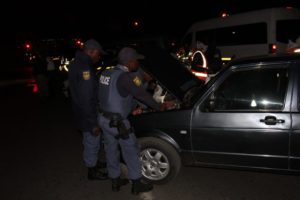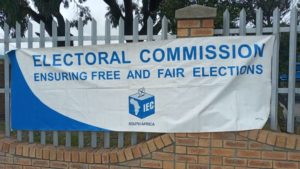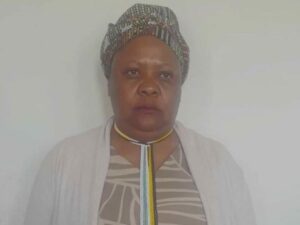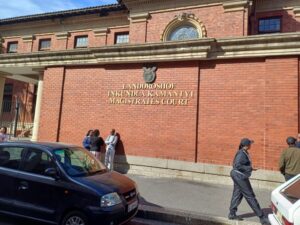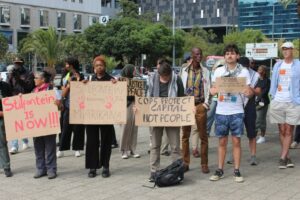
Parliament’s health chair instead of condemning Operation Dudula for preventing people from accessing public healthcare facilities, said they are choosing to ‘engage’ the vigilante group that has gained control of some clinics and hospitals. Sibongiseni Dhlomo, the chairperson of the portfolio committee on health, was responding to a question by Elitsha during the social services cluster media briefing in parliament on Thursday.
Dhlomo said they have engaged Operation Dudula (OD) because they want to understand what informs their actions. For weeks now, OD has intensified its campaign to bar undocumented migrants from public healthcare facilities – raising alarms nationwide. From Gauteng to KwaZulu-Natal, videos of people being physically removed, verbally humiliated, and ushered out of local clinics have been circulating on social media.
“We have engaged with them because we want to understand what informs them to believe that they can go to a hospital and camp there and do what they do,” said Dhlomo, a former deputy minister of health. “The minister and I said lets engage them and show them that this is not the way to go even though you have concerns.”
In 2018, the Minister of Health, Aaron Motsoaledi was accused of making the same “xenophobic” statement – that foreign nationals are the cause of overcrowding of public hospitals – by Amnesty International. Civil society organisations in the health sector have said that problems in the public healthcare are the result of budget cuts and staff shortages.
Dhlomo said he takes ‘comfort’ from the fact that “Motsoaledi is meeting with the leadership of the organisations that are expressing their concerns [OD], and they are going through certain issues. These concerns cannot be ignored.”
During his tenure as the home affairs minister, Motsoaledi announced plans to toughen asylum and immigration laws in a move that will have far-reaching consequences for foreign nationals who seek refuge in the country.
OD impunity
Médecins Sans Frontières (MSF) reports that in over half of the 15 clinics it assessed across Gauteng, patients suspected of being undocumented were physically blocked by groups of two to ten people demanding identification – sometimes in collusion with healthcare and security staff.
Mike Ndlovu, media organiser for Kopanang Africa Against Xenophobia (Kaax), said that the impact of Operation Dudula has been devastating, especially for vulnerable groups like pregnant women, children, the elderly, and people living with chronic illnesses.
Kaax have taken OD to court earlier this year – citing Home Affairs and Saps as complicit entities – to demand an end to these violations. But while the judgement was reserved, the hostile actions persist with little accountability. “Our humanitarian team have witnessed Saps consistently failing to intervene when Operation Dudula members physically block entrances to hospitals, schools, and businesses to exclude foreign nationals. This includes permitting intimidation tactics that deny access to healthcare and education.”
He added that very few people are opening cases against their assailants. A number of people have been turned away by the police or discouraged when they try. “Most victims are undocumented or asylum seekers who fear deportation or further victimisation if they approach Saps,” he said.

Vigilante action
The actions began on July 7, when OD task teams stationed themselves at clinic entrances in neighbourhoods in Tembisa, Diepsloot, Soweto and Orange Farm, demanding that undocumented patients leave – before receiving care. Families were forced out, mothers with infants left stranded.
Charlie Ngabini, regional executive committee member of OD in Ekurhuleni, who was stationed at the Ndabeni clinic in Tembisa at the time of the interview, explained that the organisation intends to rotate task teams across most clinics in Tembisa and extend their action to healthcare facilities all over Gauteng, especially the ones that he said were observed as used by a high number of undocumented African nationals.
OD has more than 14 task teams deployed. Ngabini said that they are optimistic that this number will grow because of the support from community members and their willingness to participate in what they view as a protection of available resources. “We saw that in this clinic, like many others, there is an influx of undocumented people. The community is crying to us that services are slower and that they are not getting what they need as citizens. These free health services are supposed to put South Africans first and we are ensuring that this happens.”
Ngabini explained that upon the arrival of a patient at the clinic gate, they are instructed by a task team member to produce their original identity document in order to enter. “We don’t accept any passports. A passport does not mean you can access free health services. If they don’t have an ID, we refer them to home affairs to assist them. They can also use private healthcare services which will produce care for them.”
Ngabini continued: “Not having money to afford private healthcare is not our business because we cannot continue to pay for them. Or else they should use the services in their own countries,” he said.

Health department and OD alignment
The Department of Health is proposing speedy progress towards revising immigration laws. “We need strong support from the Department of Home Affairs to process the white paper that is dealing with issues of the Immigration Act, revising and amending the Immigration Act, and revising citizenship laws. The Refugees Act also needs repeal. Some of these acts have a wide scope. The country does not have unlimited resources,” said Dhlomo.
Proponents of Operation Dudula have cited the constitution as only granting access to healthcare services to citizens only. In his input, Dhlomo also quoted section 27 of the constitution but was quick to say that he is not a lawyer and therefore could not clarify what “all” means.
